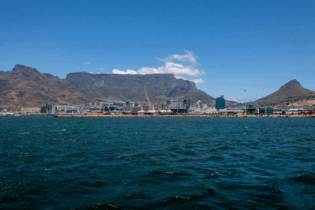The cost of phase one of the Gauteng Freeway Improvement Project (GFIP) alone has escalated significantly, to almost R90 billion.
Democratic Alliance (DA) Gauteng transport spokesperson Neil Campbell says the entire GFIP project, and not just phase one, was sold to Parliament at the estimated cost of R6.3 billion. He adds that the official opposition is alarmed at the extremely high-cost increases of the GFIP and e-tolling. “This figure has never been made public before, despite numerous attempts by the DA and the media to obtain this information over the last few years, including a Promotion of Access to Information Act application to the South African National Roads Agency (Sanral).” Guarded secret He adds there are three points of huge concern. The first is the high cost of borrowing, with interest over the 20-year loan period, which amounts to R38.3 billion, or more than six times the initial price for the entire GFIP, including the now stagnated phase two.Click here The toll operating costs on the expensive e-toll system, which amount to double the original price for the entire system, is the second cause for concern. Campbell says the third is the possibility of corruption and kick-backs when such huge sums of money are involved. “It’s no wonder that Nazir Alli [former Sanral CEO] kept the real cost of the project such a closely guarded secret.“ SANRAL did not respond to requests for comment by the time of publication.
Separating powers After the decision by Cabinet, at its meeting on 16 May, to appeal the interdict against e-tolling, Finance Minister Pravin Gordhan has applied on behalf of the South African government to the Constitutional Court of SA for leave to appeal against the interdict by the North Gauteng High Court. Judge Bill Prinsloo, in April, ruled that Sanral could not collect e-tolls.
Gordhan is supported by the ministers of transport and water and environmental affairs; the Gauteng MEC of roads and transport Ismail Vadi; and Sanral, according to the Government Communication and Information System (GCIS).
“At the heart of the dispute in this case lies a fundamental issue regarding separation of powers and whether or not a court can exercise discretionary judgement over a governmental policy decision on appropriate funding mechanisms, revenue sources and the allocation of nationally raised revenue,” says Gordhan in court papers. In the treasury budget speech this month, Gordhan said more rapid progress needs to be made in improving complementary and alternative roads in the Gauteng region. “It is clearly unhelpful, if we are to make progress in these challenges, that an important source of revenue for the road system has been delayed.”Depleted funds The GCIS says government contends that it, and not the Opposition to Urban Tolling Alliance (OUTA), which brought the case against e-tolling, or the courts can decide how to finance the GFIP. “Citizens who enjoy higher-than-standard infrastructure ought not, as a matter of policy, to be subsidised by others who do not,” says Gordhan. He adds that the equitable division of nationally collected revenue between provinces, which is governed by constitutional principles, would be compromised by a replacement of toll revenue with general government support. “Due to uncertainty about the implementation of the toll system, ratings agency Moody’s has downgraded Sanral’s rating by two notches, raising the risk of a default and leading some investors to consider selling their Sanral bonds. Sanral’s cash reserves… will be depleted by the first quarter of 2013, should e-tolling not go ahead, unless additional transfers are made from the fiscus through higher taxes for road infrastructure.” If SANRAL defaults on its loan repayments, government will have to immediately repay the entire loan. “Should the guarantee be called, there is a considerable risk of negative consequences for the South African government’s capacity to raise funds from capital markets,” Gordhan says in his affidavit. To prevent further harm to Sanral’s rating and the company’s very existence, government has asked the Constitutional Court to hear the matter urgently, in the second half of July. Source: ITWeb






